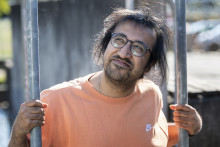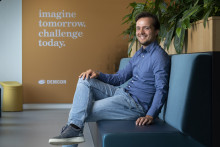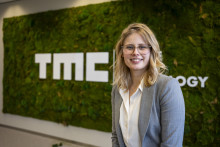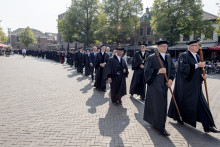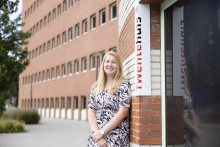What were your career plans after graduation?
‘During my studies at the UT, I became fascinated by using social entrepreneurship for sustainable development. The idea of having a profitable company that also has social impact on local communities. I did some research and I saw that social companies often have troubles attracting international talent, so I knew I wanted to target this area. I applied and many companies were interested, but in the end nobody wanted to hire me as a non-European. They said they couldn’t sponsor me. I didn’t want to leave it all up to chance, so I decided to start my own company and began working as a freelancer to get to know the industry. I started in 2019 with the first job of writing an EU proposal and now I am full-time contracted with BlueXPRT, a start-up based in Enschede specialized in bringing innovation to market through project development and execution.’
Is that how you became involved in the In-No-Plastic project?
‘Yes, we managed to acquire large funding for this project within Horizon 2020 framework. Which is fantastic because the project is also in line with what I studied and my focus on sustainability. It revolves around removal and reuse of plastic from water sources. We will target industrial hotspots as well as beaches. We have selected sites across Europe and will develop and apply clean-up technologies to remove macro-, micro- and nanoplastics.’
Funding
InNoPlastic started October 2020 and is a three year project funded with a 7.4 Million Euro grant from the EU H2020 research project, funded under the call ‘Pilot action for the removal of marine plastics and litter’, Topic ID: CE-FNR-09-2020 (Grant Agreement 101000612).
Please explain….
‘For instance, at industrial sites we will use so called SepaRaptor – a piece of technology that allows nanoparticles to agglomerate, become bigger and therefore easily separated. This has been tested and proven in air, now we will test its use in water. For the clean-up of beaches, we will use Seeker robot, autonomous robot that identifies and collects plastic waste. On top of that, we will be using smartphone applications to encourage locals to collect litter in exchange for money or gifts. I think this could also benefit low-income population and boost the blue economy, meaning the sustainable use of ocean resources for economic growth.’
Is this what you envisioned as your career path?
‘It’s definitely fascinating to see how things are researched and developed. It gives me a glimpse of what the future could be. I never had a five-year plan, so to speak. I take it step by step. So far there have been opportunities on my doorstep that I’d never anticipated.’



